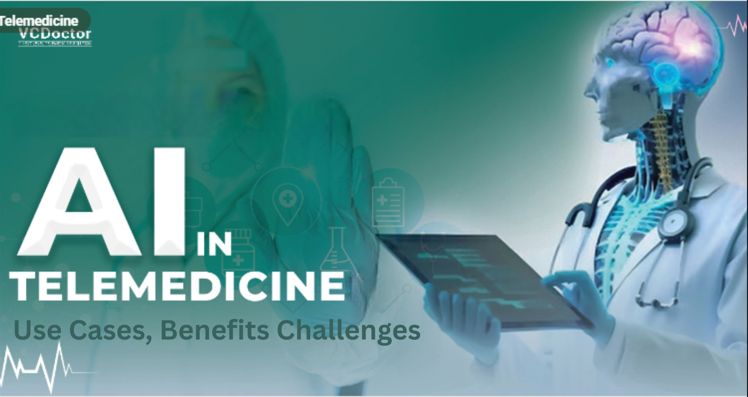What Are the Benefits of Mobile App Development for Healthcare?
- helpdeskvcdoctor
- Nov 22, 2024
- 4 min read

Mobile apps are transforming healthcare by making it more accessible, efficient, and patient-friendly. With smartphones becoming an essential part of daily life, healthcare providers and patients are increasingly turning to mobile apps to improve care, track health, and communicate. This article explores the key benefits of mobile app development for healthcare, highlighting its impact on patients, healthcare providers and the industry as a whole.
Benefits of Mobile App Development for Healthcare
1. Improved Patient Engagement
One of the most important benefits of healthcare mobile apps is how they improve patient engagement. In traditional healthcare, patients have to visit doctors in person, which can be time-consuming. Mobile apps make it easier for patients to manage their health from home. With apps, patients can schedule appointments, view their medical records, receive medication reminders, and communicate directly with their healthcare providers.
When patients use apps to actively engage with their health, they are more likely to follow treatment plans, stay on top of appointments, and take their medication as prescribed. This leads to better health outcomes and helps patients feel more in control of their care.
2. Remote Monitoring and Telemedicine
Mobile apps allow healthcare providers to monitor patients remotely, making it easier to care for those with chronic conditions or those who live in areas far from healthcare centres. Through mobile apps, doctors can track things like blood pressure, heart rate, and glucose levels without the patient needing to visit the clinic.
Telemedicine, or virtual healthcare, has grown in popularity, especially during the COVID-19 pandemic. With telemedicine apps, patients can have video consultations with doctors, reducing the need for in-person visits. This saves time for both patients and healthcare professionals and provides care to people in remote areas or those unable to travel.
3. Cost Savings
Mobile apps help reduce healthcare costs in several ways. First, they make it easier for patients to get the care they need without going to the hospital. Virtual visits and remote monitoring mean fewer in-person appointments, which saves time and money for both healthcare providers and patients. For example, a patient might avoid expensive emergency room visits by using an app to get a virtual consultation early when symptoms first appear.
Additionally, apps that help patients manage chronic conditions, such as diabetes, can prevent costly hospital readmissions by providing reminders for medication and check-ups.
4. Better Data Management and Security
Mobile apps help healthcare providers manage patient data more efficiently. Medical records, test results, and prescriptions can all be stored and accessed securely on apps, making it easier for doctors to get the information they need in real time.
Data security is a top priority in healthcare, and mobile apps use features like encryption, two-factor authentication, and biometric login to protect sensitive patient information. By using HIPAA-compliant telehealth platforms healthcare apps keep patient data safe and secure.
5. Improved Collaboration Between Healthcare Providers
Healthcare often involves a team of professionals working together to care for a patient. Mobile apps help improve communication and collaboration among doctors, specialists, nurses, and other healthcare workers. Through secure messaging and shared access to patient records, healthcare providers can discuss a patient’s treatment plan and make decisions faster.
This means that patients can receive more coordinated care, with all team members on the same page about the treatment they are receiving. The result is better, more efficient healthcare.
6. Increased Efficiency for Healthcare Providers
Mobile apps make it easier for healthcare professionals to manage their daily tasks. Doctors and nurses can access patient information, schedule appointments, send prescriptions, and communicate with patients all from their mobile phones. This helps reduce administrative work and allows healthcare providers to spend more time on patient care.
Mobile apps also allow telemedicine software to use advanced technologies like artificial intelligence (AI) to assist with diagnostics and treatment plans. This technology helps doctors make faster, more accurate decisions, improving overall care and productivity.
7. Personalized Health Solutions
Mobile apps can offer personalized health recommendations based on a person’s unique medical history and health goals. For example, an app might recommend a specific diet plan or exercise routine based on a user’s health conditions. These personalized plans help users get the most relevant and effective advice for their health needs.
Additionally, some apps use AI to analyze patient data and suggest treatments or actions that might be more effective. This level of customization ensures that patients receive care tailored to their specific needs.
8. Better Decision-Making with Data Analytics
Healthcare apps collect large amounts of data from patients, which can be used to improve decision-making. By analyzing this data, healthcare providers can identify trends, predict potential health issues, and make better-informed decisions. For example, predictive analytics can help doctors spot warning signs of serious conditions before they become critical.
Analytics also help healthcare organizations identify areas where care can be improved, making the entire healthcare system more efficient. This data-driven approach leads to better outcomes for patients and helps providers allocate resources where they’re needed most.
Conclusion
Mobile app development is transforming the healthcare industry by making care more accessible, efficient, and personalized. Whether it’s through better patient engagement, remote monitoring, cost savings, or improved decision-making, mobile apps are helping to shape the future of healthcare. With technology continuing to advance, the role of mobile apps in healthcare is expected to grow even further, bringing more innovative solutions that benefit both patients and healthcare providers. By making healthcare easier to access and more affordable, mobile apps are improving the overall healthcare experience for everyone involved.








Comments